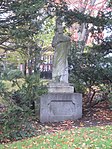Statue of Christopher Columbus (Beacon Hill, Boston)
Beacon Hill, BostonMarble sculptures in MassachusettsMassachusetts sculpture stubsMonuments and memorials in BostonMonuments and memorials to Christopher Columbus ... and 4 more
Outdoor sculptures in BostonSculptures of men in MassachusettsStatues in BostonStatues of Christopher Columbus

A statue of Christopher Columbus is installed in Boston's Beacon Hill neighborhood, within Louisburg Square, in the U.S. state of Massachusetts. A Greek merchant, Joseph Iasigi, presented the statue to the city in December 1849. A captain of one of his vessels had loaded it onto a ship in Italy as ballast, alongside a statue of Aristides which was also donated. Both statues are described as "inferior" and "unremarkable" by art critics. The Italian marble sculpture was carved in Leghorn and depicts Columbus as a boy.
Excerpt from the Wikipedia article Statue of Christopher Columbus (Beacon Hill, Boston) (License: CC BY-SA 3.0, Authors, Images).Statue of Christopher Columbus (Beacon Hill, Boston)
Pinckney Street, Boston Beacon Hill
Geographical coordinates (GPS) Address Nearby Places Show on map
Geographical coordinates (GPS)
| Latitude | Longitude |
|---|---|
| N 42.358751 ° | E -71.068823 ° |
Address
Pinckney Street 85
02114 Boston, Beacon Hill
Massachusetts, United States
Open on Google Maps









